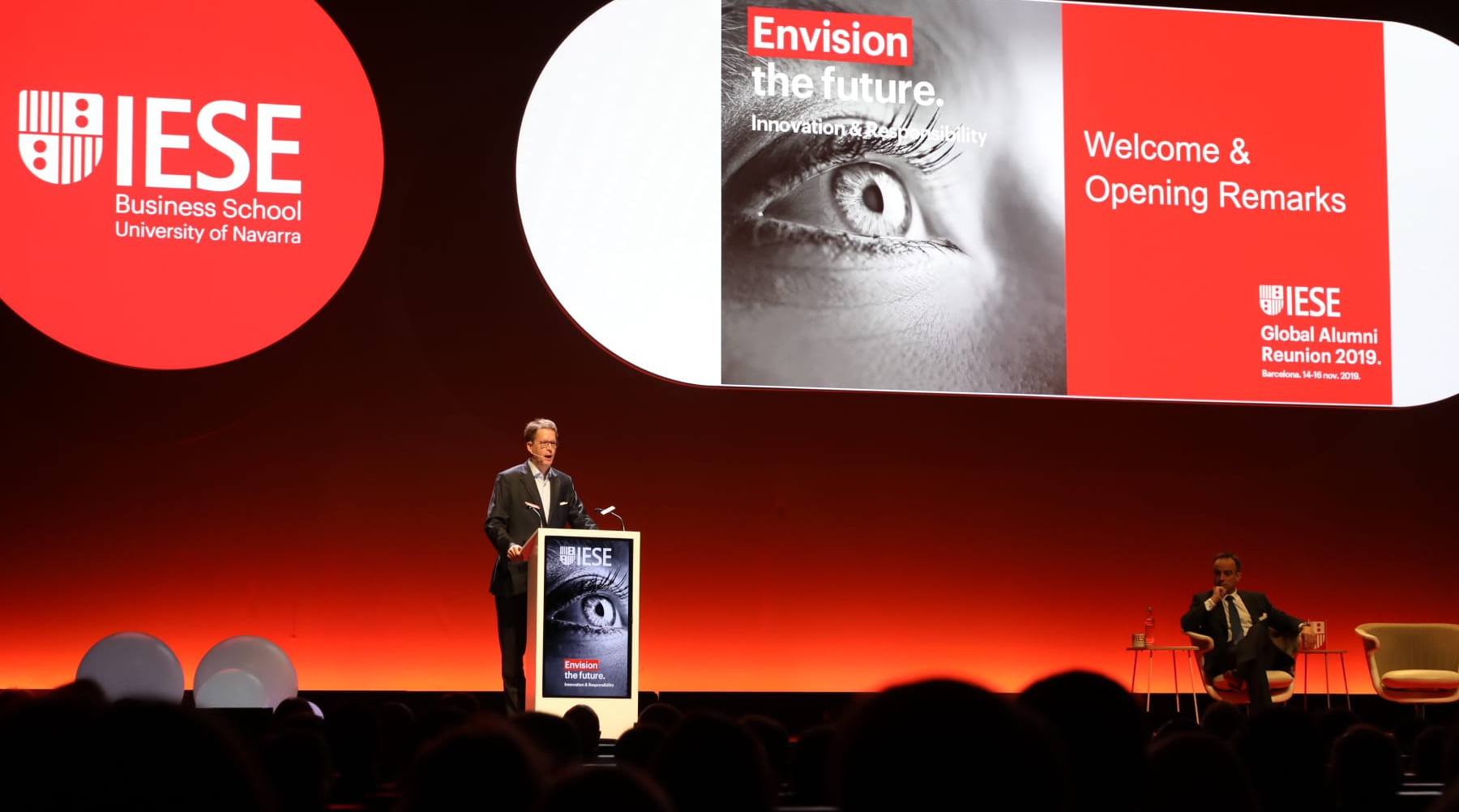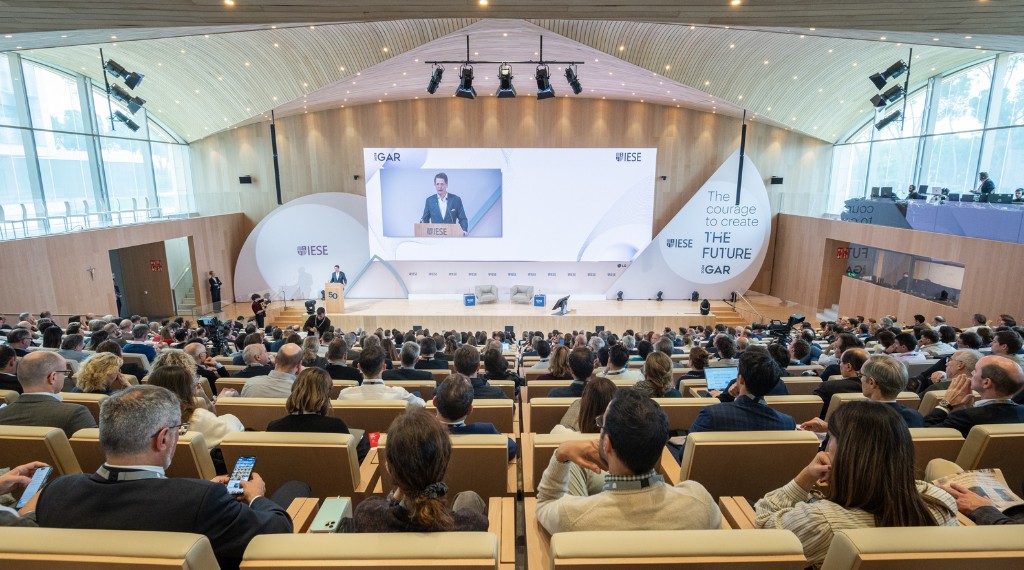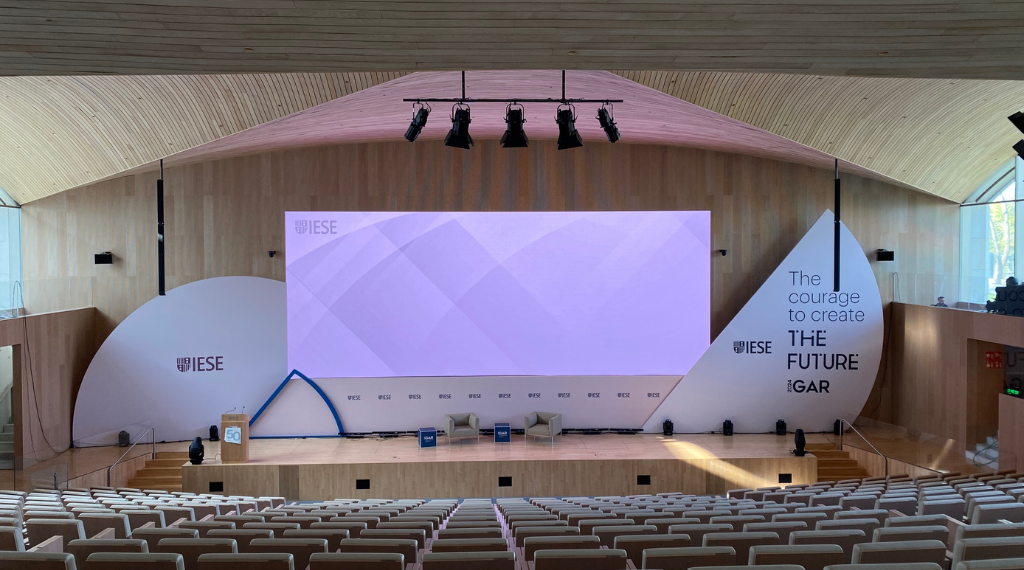Stories
Purpose and social impact set innovation agenda
2,000 executives gather for Global Alumni Reunion 2019
Dean Franz Heukamp opens IESE’s Global Alumni Reunion 2019.
Foto: Ignacio Arregui
November 15, 2019

IESE’s Global Alumni Reunion 2019 looked to a future filled with innovation and technology in business, while continuously circling back to the wellbeing and prosperity of the people who will populate those workplaces.
The theme of this year’s reunion in Barcelona was Envision the Future: Innovation and Responsibility, and some 2,000 executives attended the three-day event.
Dean Franz Heukamp opened the reunion reminding participants that innovation should always be a force for the greater good, and that business must be mindful of individuals and society. “We all see and feel that this is a moment of fast and sometimes profound change in the world,” Heukamp said, and business is a “very relevant driver of change.”
He noted that the U.S. Business Roundtable’s recent pivot to a multi-stakeholder vision of the firm – away from one based on shareholder primacy – is a vision IESE has had since its creation 60 years ago. “I see IESE as the school for purpose,” the dean said.
Prof. Pedro Videla, academic director of the reunion, also urged business leaders to take the long view. “We have to determine what future we want to have, and the future that we are going to have is the future we deserve,” he said.
The day continued with a series of talks by author Tal Ben-Shahar; the Women’s Tennis Association’s Micky Lawler; HBS Prof. Kathleen McGinn; and David Carmona of Microsoft. Agustín Carstens, head of the Bank for International Settlements, and Jaime Caruana of BBVA finished the day.
Keys to finding happiness
Ben-Shahar, a best-selling author and lecturer, discussed the importance of finding happiness. For him, that involves what he calls “permission to be human,” or learning to welcome the full range of human emotions, from joy to sadness and everything in between.
“The problem with today’s culture is that we do not give ourselves permission to experience the full range of emotions,” he said. “There is a paradox at play here. And the paradox is that when we suppress painful emotions they only intensify, they grow stronger.”
“The first step to happiness is allowing in unhappiness,” he added. The next is managing stress – accepting the value of taking time off to recover from stress, which over the long run will make us more productive, creative and motivated. The final ingredients to happiness are giving to others and being generous with ourselves, along with cultivating deep relationships, Ben-Shahar said.
Fostering gender parity and diversity
Two of the speakers – the WTA’s Lawler and HBS’s McGinn – spoke about issues related to gender and diversity in business and sport.
The WTA was founded in 1973, a time when prize money for women tennis players was one-tenth of that of men. That has changed some – prize money has doubled over the last 10 years — but the journey of women athletes remains markedly different than for men.
“It’s a really tough existence,” Lawler said of the gruelling season and personal sacrifices. Still, female athletes are role models to younger girls. “We have role models, we have kids who look up to these role models. We’re contributing even in the tiniest of ways to social change,” she said.
Lawler drew a number of parallels between professional athletes and business leaders. Part of the WTA’s success has been maintaining a startup mentality, which she said “is absolutely critical to the success of any business.”
For Lawler, sport and business require balance between humility and confidence, empathy and competitiveness. You also need to be focused and disciplined. “You can have incredible skills as an athlete but your mental skills also have to be fine-tuned and strong. All this applies to business as well.”
McGinn, for her part, also touched on wellbeing, but from the angle of inclusiveness. She noted that hiring diverse employees is a first step, but organizations must move onto “meaningful engagement” with people of all different backgrounds. There’s no quick answer to inclusiveness, and it requires repeated cycles of analysis and action. “Diversity only works when organizations are truly inclusive,” she said.
But there definitely are pay-offs. Organizations expand their pool of talent, and companies listed among the best places for women to work are often places where everybody wants to work. “We need the absolute best people in our organizations. We need the largest talent pool possible,” she said.
Artificial intelligence and global economy
David Carmona, general manager of artificial intelligence at Microsoft, described how to create an AI-enabled company.
He noted that despite widespread awareness that AI — now capable of learning, perception and cognition — will disrupt businesses, companies are still slow to adopt. “Now all companies are aware that their business will be disrupted by AI but adoption levels are still low.”
To close the gap, leadership is needed in three areas: strategy, business units (so that AI is applied across processes), and employees (ensuring everyone shares the data-driven approach).
He recommends companies start with their technical departments as they incorporate AI – because it’s manageable and because without the technical capacity efforts will fail.
Without a cultural transformation in any company it’s difficult to spread AI. “If we focus only on strategy, it’s not going to work. I need to work on the culture,” said Carmona. “We have to make sure that we have a culture, an environment, where we can have AI heroes.”
The final session of the day was an outlook on the global economy by Agustín Carstens, head of the Bank for International Settlements, and Jaime Caruana, independent member of the BBVA’s board of directors.
They said growth is slowing, and that there has been an over-reliance on monetary policy and low interest rates, which is unsustainable. Other policies are required, including structural and fiscal reforms.
Caruana was optimistic, however, that over the long term, more jobs will be created.
Three-day event
The Global Alumni Reunion got underway on Thursday, with visits to companies such as Tesla, Amazon, Mango and FC Barcelona. There was also an Entrepreneurship Day on Thursday, which featured visits to entrepreneurial hotspots Barcelona Tech City, Barcelona Activa and Barcelona Health Hub and to IESE’s Venture Hub. The day was topped off by panels of emerging technology and impact startups.
The Global Alumni Reunion ends on Saturday with an 8km Solidarity Run through Collserola Natural Park, which will raise funds for IESE’s scholarship program.







